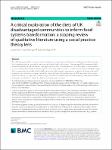A critical exploration of the diets of UK disadvantaged communities to inform food systems transformation: a scoping review of qualitative literature using a social practice theory lens
| dc.contributor.author | Hunt, L | |
| dc.contributor.author | Pettinger, C | |
| dc.contributor.author | Wagstaff, C | |
| dc.date.accessioned | 2023-10-11T14:44:46Z | |
| dc.date.available | 2023-10-11T14:44:46Z | |
| dc.date.issued | 2023-10-11 | |
| dc.identifier.issn | 1471-2458 | |
| dc.identifier.issn | 1471-2458 | |
| dc.identifier.other | 1970 | |
| dc.identifier.uri | https://pearl.plymouth.ac.uk/handle/10026.1/21381 | |
| dc.description.abstract |
The UK food system affects social, economic and natural environments and features escalating risk of food insecurity. Yet it should provide access to safe, nutritious, affordable food for all citizens. Disadvantaged UK communities [individuals and families at risk of food and housing insecurity, often culturally diverse] have often been conceptualised in terms of individual behaviour which may lead to findings and conclusions based on the need for individual change. Such communities face public health challenges and are often treated as powerless recipients of dietary and health initiatives or as ‘choiceless’ consumers within food supply chains. As transforming the UK food system has become a national priority, it is important a diverse range of evidence is used to support understanding of the diets of disadvantaged communities to inform food systems transformation research. A scoping review of UK peer reviewed qualitative literature published in MEDLINE, CINAHL Plus with Full Text, EMBASE, PsycINFO and Web of Science between January 2010 and May 2021 in English. Eligibility criteria were applied, a data extraction table summarised data from included studies, and synthesis using social practice theory was undertaken. Forty-five qualitative studies were reviewed, which included the views of 2,434 community members aged between 5 and 83. Studies used different measures to define disadvantage. Synthesis using social practice theory identified themes of food and dietary practices shaped by interactions between ‘material factors’ (e.g. transport, housing and money), ‘meanings’ (e.g. autonomy and independence), and ‘competencies’ (e.g. strategies to maximise food intake). These concepts are analysed and critiqued in the context of the wider literature to inform food systems transformation research. This review suggests to date, qualitative research into diets of UK disadvantaged communities provides diverse findings that mainly conceptualise disadvantage at an individual level. Whilst several studies provide excellent characterisations of individual experience, links to ‘macro’ processes such as supply chains are largely missing. Recommendations are made for future research to embrace transdisciplinary perspectives and utilise new tools (e.g., creative methods and good practice guides), and theories (e.g., assemblage) to better facilitate food systems transformation for disadvantaged communities. | |
| dc.format.extent | 1970- | |
| dc.format.medium | Electronic | |
| dc.language | en | |
| dc.publisher | BioMed Central | |
| dc.subject | Disadvantaged communities | |
| dc.subject | Qualitative evidence | |
| dc.subject | Scoping review | |
| dc.subject | Food system research | |
| dc.subject | Social practice theory | |
| dc.title | A critical exploration of the diets of UK disadvantaged communities to inform food systems transformation: a scoping review of qualitative literature using a social practice theory lens | |
| dc.type | journal-article | |
| dc.type | Review | |
| plymouth.author-url | https://www.ncbi.nlm.nih.gov/pubmed/37821837 | |
| plymouth.issue | 1 | |
| plymouth.volume | 23 | |
| plymouth.publisher-url | http://dx.doi.org/10.1186/s12889-023-16804-3 | |
| plymouth.publication-status | Published online | |
| plymouth.journal | BMC Public Health | |
| dc.identifier.doi | 10.1186/s12889-023-16804-3 | |
| plymouth.organisational-group | |Plymouth | |
| plymouth.organisational-group | |Plymouth|Research Groups | |
| plymouth.organisational-group | |Plymouth|Faculty of Health | |
| plymouth.organisational-group | |Plymouth|Faculty of Health|School of Health Professions | |
| plymouth.organisational-group | |Plymouth|Research Groups|Institute of Health and Community | |
| plymouth.organisational-group | |Plymouth|REF 2021 Researchers by UoA | |
| plymouth.organisational-group | |Plymouth|Users by role | |
| plymouth.organisational-group | |Plymouth|Users by role|Academics | |
| plymouth.organisational-group | |Plymouth|REF 2021 Researchers by UoA|UoA03 Allied Health Professions, Dentistry, Nursing and Pharmacy | |
| dc.publisher.place | England | |
| dcterms.dateAccepted | 2023-09-21 | |
| dc.date.updated | 2023-10-11T14:44:44Z | |
| dc.rights.embargodate | 2023-10-13 | |
| dc.identifier.eissn | 1471-2458 | |
| rioxxterms.versionofrecord | 10.1186/s12889-023-16804-3 |


